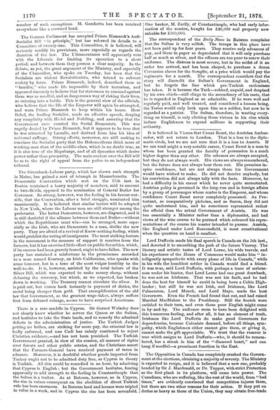It is believed in Vienna that Count Beust, the Austrian
Ambas- sador, will not return to London. That is a loss to the diplo- matic circle, but we are not sure that it is a loss to Austria. If we can read aright a very notable career, Count Beust is a man to whom has been granted the faculty of persuasion in a much higher degree than any other. His schemes are always accepted, but they do not always work. His views are always remembered, but the future does not always bear them out. His promises in- spire confidence, but are not always those his Government would have wished to make. He did not deceive anybody, but his conviction did not always tally with the facts. Moreover, he had a difficulty in his career which he never quite surmotinted. Austrian policy is governed in the long-run and in foreign affairs by a group of personages whose centre is the Emperor, and whose confidence Count Beust never completely possessed. As Pro- testant, as comparatively plebeian, and as Saxon, they did not quite understand him, and he sometimes represented rather the official than the actual Government of Austria. He was too essentially a Minister rather than a diplomatist, and had views of the wise course to be pursued which coloured his repre- sentations of the course his master intended to pursue. Austria, like England under Lord Beaconsfield, is most constitutional when the question on hand is smallest.






























 Previous page
Previous page